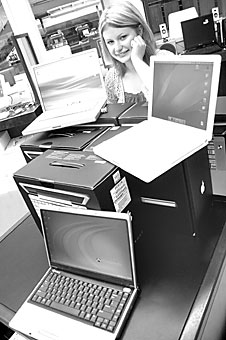 |
|
Jacob Konst/Arizona Daily Wildcat
|
ASUA Sen. Rhonda Tubbs is working toward a program, based in the UofA Bookstore, that would loan out laptops to students for free.
|
|
|
By Nick Smith
Arizona Daily Wildcat
September 15, 2005
Print this
Free mobile access program awaiting grant approval
Students who depend on campus computers to get their work done may have the option by the end of the semester to check out a laptop, which would free up other congested computer areas, officials said.
The laptop loan program is in the development phase and is awaiting grant approval, said Rhonda Tubbs, the ASUA senator who is trying to get the program off the ground.
The pilot version of the program will operate out of the Main Library at the Office of Student Resources Helpdesk. Students can use their CatCard to sign up and check out a laptop for four-hour blocks at a time, she said.
The program is expected to kick into effect late November or early December, provided the project's grant goes through, Tubbs said.
Tubbs said she is applying for a grant to fund the project through the Parents' Association. The grant is for $14,000 and is expected to cover the purchase of 10 laptops and money for marketing the campaign.
Each laptop is expected to cost $1,200. Software will be continually upgraded if the laptop loan project proves to be a success.
"We want to get the best computers with the best software," Tubbs said.
Using a loaned laptop would be free for students, but a small fee would be charged to the student's bursar's account if the laptop is returned late.
The loan program will ease the wait time for students who want to use a campus computer but can't due to limited availability, Tubbs said.
"If you've gone to the ILC, sometimes it's full of business students," said Tubbs, an economics senior.
Busy hours at the Information Commons area of the Manuel T. Pacheco Integrated Learning Center tend to occur between 10 and 11 p.m., said Robert Mitchell, a librarian at the Information Commons help desk.
During this time approximately all of the Information Commons' 300 computers are in constant use, Mitchell said.
Wait time and volume to use these computers is another factor to consider.
"There may be 10, 15 or 20 people waiting for computers," said Rae Swedenburg, a library supervisor at the Information Commons. "The typical wait time is 10 minutes or so."
Similar projects were undertaken at the University of California, Los Angeles and at the University of Colorado at Boulder with promising results. The number of laptops involved in the UCLA program started with 10 and grew to 220 over three years, Tubbs said.
Students utilizing the laptop loan program can use the computers for anything from checking e-mail to working on group projects or giving classroom presentations, Tubbs said.
Students like Tana Ganeva, who leave their computers at home and use campus computers, may benefit from the program.
"It's not fair to assume that everyone could afford their own laptop," said Ganeva, a media arts graduate student.
